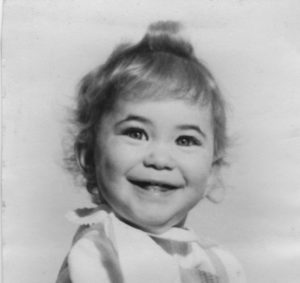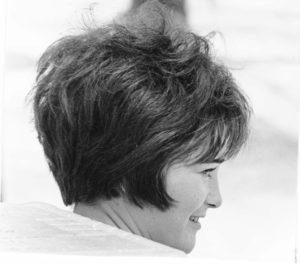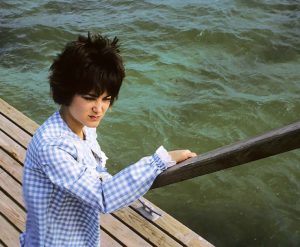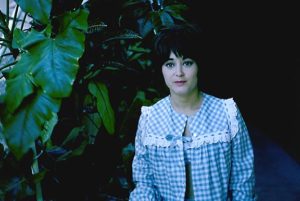Gail
 Because we didn’t share any classes, and because she was living in the women’s dormitory, far from my apartment, I didn’t see her again for a while. The following year I found myself serving as a teaching assistant in one of her classes. I spent as much time as I could trying to help her while neglecting the other students. One day, we stood together at the chemical hood while she was carrying out a tricky procedure. I gently suggested that she could do it with a different technique, but when I took up one of the reagents, I inadvertently spilled something. “You’ve ruined my experiment”, she protested. These days, whenever anyone asks how we met, she tells them of my clumsiness. Some mistakes are never lived down.
Because we didn’t share any classes, and because she was living in the women’s dormitory, far from my apartment, I didn’t see her again for a while. The following year I found myself serving as a teaching assistant in one of her classes. I spent as much time as I could trying to help her while neglecting the other students. One day, we stood together at the chemical hood while she was carrying out a tricky procedure. I gently suggested that she could do it with a different technique, but when I took up one of the reagents, I inadvertently spilled something. “You’ve ruined my experiment”, she protested. These days, whenever anyone asks how we met, she tells them of my clumsiness. Some mistakes are never lived down.
In an attempt to make up for my ineptitude, I offered to drive her to the beach after class. It was our first date. At the time, my parents had gifted me an Alfa Romeo, a white convertible sports car of Italian origin that looked glamorous, but actually was a flawed vehicle whose parts fell off with embarrassing regularity. The car was a present from parents who were grateful that their son seemed to have finally found something he was good at. They reasoned that it was cheaper for them to buy me a car then having to support me for the rest of his life. I put the top down and we drove to Garbage Beach, which, despite the name, was a pretty, romantic spot off of the Rickenbacker Causeway leading to Key Biscayne. As we approached the first bridge, we came to a toll both. I told Gail that I would pay the toll to the beach (25 cents) and that she should pay on the way back. She gave me a look that would have frozen a blow torch, and it took all of my considerable charm to keep her from jumping out of the car. I explained that it was a joke. The toll was collected only one way.
 Despite these bumpy beginnings, we soon were seeing each other regularly. We took French classes together (a doctoral degree requirement at the time was that a student must have a reading knowledge of two foreign languages; I was hopeless at both French and Russian, the two that I chose, and had great difficulty leaping over this hurdle) and held hands in the back row. On weekends, we went spin fishing together for grunts and snapper in the upper Florida Keys. We caught shrimp at night from one of Miami’s bridges, using a Coleman Lantern and a long net. One day, after a particularly romantic evening, I proposed. It was not one of those “get down on your knees” propositions, more like an offhand remark that seemed appropriate to the occasion. Nevertheless, she accepted.
Despite these bumpy beginnings, we soon were seeing each other regularly. We took French classes together (a doctoral degree requirement at the time was that a student must have a reading knowledge of two foreign languages; I was hopeless at both French and Russian, the two that I chose, and had great difficulty leaping over this hurdle) and held hands in the back row. On weekends, we went spin fishing together for grunts and snapper in the upper Florida Keys. We caught shrimp at night from one of Miami’s bridges, using a Coleman Lantern and a long net. One day, after a particularly romantic evening, I proposed. It was not one of those “get down on your knees” propositions, more like an offhand remark that seemed appropriate to the occasion. Nevertheless, she accepted.
Immediately I had misgivings. Many thoughts whirled around my head. Wasn’t I too young? Did I have enough experience to make the right choice? What about some more comparison shopping? Gail was both intelligent and beautiful, she made me happy, but couldn’t there be other women even more attractive or ones that would please me even more? And weighing most heavily was the thought that this commitment was for life. My parents had a very happy marriage, or at least that was what my mother claimed. How could I be sure that Gail and I would be compatible in the long run? I had seen many unhappy relationships. I aimed to honor my commitments. A lifetime together might be a very long time to sustain a relationship. In distress, I told Gail that we should keep our engagement secret. She was puzzled, but agreed. After a week of inner turmoil, I confessed to Gail and I couldn’t go through with it: I was unsure and unready. I took back my proposal. We argued. She cried. I was wretched. In the end, she told me that she didn’t want to see me anymore.
 A few days went by. The Miami weather had turned cold and dark. A unusual light mist hid the tops of the palm trees. I found myself standing on the second floor steps outside the laboratory of the Hernando building, gazing across the street. A few months earlier, Gail had moved into a nearby ground floor apartment. It was where I had proposed. I could see her door, her curtains, her windows. I was miserable. More miserable than I had ever been. Maybe more miserable than I was to ever be again. It felt as if I had become encased in a spider’s web, poisoned, hardly able to take a breath, slowly feeling a weight compressing my chest. Lonely and forlorn, the world seemed to have slowed to a crawl. Everything looked grey and dull. It slowly occurred to me that I couldn’t maintain this wretched state for very long, that I had to make a decision, one that would be consequential, life changing. It was just too painful to continue as I had been.
A few days went by. The Miami weather had turned cold and dark. A unusual light mist hid the tops of the palm trees. I found myself standing on the second floor steps outside the laboratory of the Hernando building, gazing across the street. A few months earlier, Gail had moved into a nearby ground floor apartment. It was where I had proposed. I could see her door, her curtains, her windows. I was miserable. More miserable than I had ever been. Maybe more miserable than I was to ever be again. It felt as if I had become encased in a spider’s web, poisoned, hardly able to take a breath, slowly feeling a weight compressing my chest. Lonely and forlorn, the world seemed to have slowed to a crawl. Everything looked grey and dull. It slowly occurred to me that I couldn’t maintain this wretched state for very long, that I had to make a decision, one that would be consequential, life changing. It was just too painful to continue as I had been.
 I walked across the street and knocked on her apartment door. “I can’t go on like this. I’m terribly unhappy without you. Maybe, I’ll make you unhappy too, but at least we’ll be miserable together. Let’s get married.” It wasn’t a classic Hollywood proposal, but it proved effective. We got married on the day after Christmas a few months later in 1964. It’s been more than 50 years. A long time indeed.
I walked across the street and knocked on her apartment door. “I can’t go on like this. I’m terribly unhappy without you. Maybe, I’ll make you unhappy too, but at least we’ll be miserable together. Let’s get married.” It wasn’t a classic Hollywood proposal, but it proved effective. We got married on the day after Christmas a few months later in 1964. It’s been more than 50 years. A long time indeed.